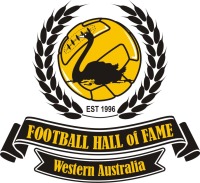Book Review: Were You Any Good Sir?
By Richard Kreider
VERY few of our senior Western Australian football fans will not know Doug Stewart. This humble Burmese-born champion has experienced more than most – yet more importantly, has given back to the game more than most. And he has proved this in a 123-page biography that is captivating reading.
The title of the book came from an experience he had during one of his countless FunSkills coaching sessions, where a blonde curly-haired six year old asked if Doug had in fact played football himself. “The question caught me by surprise,” said Doug as he gathered his thoughts before answering. “Yes, but only in a friendly way nowadays with my friends and young people.” “Were you any good sir?” replied the young football fan. “All eyes were on me waiting for an answer, I felt I must answer truthfully without mentioning successes along the path of my career. As I grew older, I practiced all the things that my teachers and coaches asked me to do I practiced every day and I became a better footballer. I became captain of my school’s football team.” Such a response is indicative of this modest man, where many would have simply boasted about the number of trophies they had won. The question also became the catalyst to Doug writing about his memoirs. The opening chapter talks about Doug’s time in Maymyo, upper Burma, where he lived with his parents and siblings. It is there he was first introduced to football as a six-year old at a convent school. The ball was in fact a tennis ball and goalposts were trees in the playground. From there, after his convent days, Doug was sent to a boarding school in Darjeeling (St Joseph’s College) in the Himalayas. “The journey from the hill station of Maymyo to Darjeeling took several days and covered nearly two thousand miles (3200km),” writes Doug. “We went by steamer, rail, cargo vessel, metre gauge rails and car, from one country to another.” Sport was a vital component in the life of students and a compulsory activity. “Competition between departments was very keen in cricket, football and hockey. Victory was rewarded in ways such as free study periods, a loss however meant practice, like running gauntlet of wet towels or a dumping in a pond.” Doug’s personal football journey included captaining the school team on every occasion until his final year (1948). British soldiers that happened to be professional footballers were stationed in Darjeeling, which gave Doug a perfect opportunity to see first-hand quality football. His door into the world of working for a living opened as an Inspector with the Burma Rice Mills Stage Agricultural Marketing Board (SAMB), but it also allowed him to be under the care of the company’s football team coach Mr Beaucanen. The company team caused quite a stir in 1949 as it contained a number of national team players, and it quickly gained promotion to the top flight after winning the second division title and Rice Millers Challenge Cup. At 18 years old, his footballing talents were immediately recognised as he represented Burma against Sweden and Malayan Tigers. SAMB won the first division title in 1950 as well as the Presidents Challenge Cup, while Doug again represented Burma, in friendlies against Vietnam and Thailand. The following year, Doug accepted a position with Pan American Airways in Calcutta, as well joining a first division football team called Rajastan, which consisted of Sikhs, Indians and Pakistanis. In 1952, he was given what he had always been dreaming about, a coaching role at his former Saint Joseph’s College, officially as sports master, as well as teacher. He remained in the position through 1953, the year he met Tenzing Norgay, half of the Hillary and Tenzing duo that conquered Mount Everest that year. “Tenzing used to hire horses to us on weekend outings at the Chowrusta (public square) in town (Darjeeling),” wrote Doug. The book then focuses back on his football involvement, which includes representing Burma at the 1954 Asian Games in Manila. His coach was former Preston North End striker Alex Weir, a hard taskmaster whose coaching regime would cause a player uprising with several players walking out. They eventually returned when Weir changed his attitude on how to coach the local player contingent. Weir returned to England the following year to take up a coaching role at Hayes and later the helm of Iceland in 1957. Scot Weir passed away in 2003. Burma lost the opportunity to play in the 1954 final when they lost a coin toss to Korea after their late game was drawn and there was no time for a replay. They beat Indonesia in the 3rd v 4th playoff as a form of consolation. For their achievement, they were driven around Rangoon in an open bus. Doug would go on to represent Burma fourteen times before landing in Perth in April 1955. After a short stint as weighbridge operator for Cooperative Bulk Handling in country town Bindi Bindi, Doug returned to Perth and was given journalist Frank Miller’s phone number to help him find a football team. Doug was given four clubs to pick from: North Perth, Azzurri, Swan (Athletic) and Windmills. He opted for North Perth and was signed on by Archie Martin who was well known around Perth for his chain of electrical stores. The North Perth coach was Con Purser, the only WA footballer at the 1956 Melbourne Olympics. Doug’s choice of club proved fruitful as North Perth went on the win the 1955 league title, one point ahead of Perth City. They emulated this the following year, two points in front of the rapidly improving Azzurri. Doug won another league title with East Fremantle Tricolore in 1958. “It was during this time I entered Claremont Teacher’s College because my overseas teaching experience was not recognised here,” writes Doug. “It was also about this time, there was an influx of migrants into Australia from European countries. Among these migrants were a number of professional footballers and coaches. Many joined their ‘national’ clubs like the Greeks, Italians, Yugoslavs and Germans,” writes Doug. “The only time they seemed to break out of their comfort zone was to go to the football match. Mums, Dads and children all put on their Sunday best. It was also time for some to make new friends from other nationalities.” Doug’s first cap for the Western Australian State side wasn’t long after setting foot in the State, where he faced Austrian giants Rapid Vienna in August 1955 at Subiaco Oval - eventually playing eleven times in the black and gold. He became club coach of Tricolore in 1958, the same year he represented Australia against Blackpool FC in Adelaide. “I met Stanley Matthews who was staying at the same hotel as the Australian squad, and had wonderful conversations,” writes Doug who also faced Scottish club Heart of Midlothian the following year in Perth. “These selections for Australia made me a double-international,” writes a proud Doug. In 1960 Doug moved to New Guinea to take up a senior teaching position as Headmaster of a boarding school, then as headmaster of a Primary School (Wewak) for a further two years – before returning to WA in 1963. He would coach the likes of Swan Athletic, Azzurri (league title and D’Orsogna Cup win in 1967 and came close to beating Sydney champions Hakoah FC in the semi-finals of the 1968 Australia Cup). After eventually acquiring his senior coaching certificate in January 1969, Doug went on to coach the WA State side (12 games) on top of another stint at Azzurri. He was also running his own residential soccer camps, which would be the precursor to his Funskills program in years to follow. And if coaching wasn’t enough to keep him busy, Doug had now become a regular columnist for the Sunday Independent.
Doug then headed east in 1973 when he took charge of Canterbury Marrickville only to resign while the team were topping the table, over player selection, when the club committee were demanding certain players be selected. Next, Doug was off to the ACT in 1974 as Assistant Principal of Holder Primary School, but was also prominent in the forming of the first ACT Coaches Association in 1975 of which Doug became President. He would also become a founding member of the Canberra City Soccer Club in 1976, the year before a brand new National Soccer League commenced. Doug then became national under-16 coach and coach of the Canberra Arrows Youth team in the National Australia Youth League. Doug’s next commitment was back overseas, overseeing the Brunei Sports Development Programs for three years. He arrived back in Perth in 1988 to work in various areas of the Education Department, before heading off to the Northern Territory to take up more teaching roles, along with his wife. But since Doug loved his football, he soon became coach of several NT teams, including guiding NT to victory at the State Amateur Championships in 1994. Doug set off to Queensland in 1997 and it was there where he started up his successful Funskills Football program three years later, designed for primary aged boys and girls, from five to ten years old. Typically, he was also coaching various age levels side around Rockhampton. In 2004 Doug was chosen by the Football Hall of Fame WA as one of the State’s Top 100 players from 1902 to 2002, of which Doug believes he had coached 26 others at one time or another. “I have travelled overseas on football and teaching commitments, but the period I had with Western Australian football will always top the list in my football life,” writes Doug. And after reading this personal biography cum footballing pilgrimage, it is easy to see why. Yet, that shouldn’t undervalue the countless achievements and accomplishments elsewhere.
Doug Stewart is indeed a champion of the world game. And yes, Doug, you certainly were good!
PIC ONE: Doug's book cover. PIC TWO: Doug (centre) is congratulated by Dr Ken Maguire and John Birighitti on being inducted into the Football Hall of Fame WA in 2012. PIC THREE: The 1960 State Squad (Federation)
Rear l-r: Nick Ivanoff (Olympic), Frank Verharen (Windmills), Con Purser (V-Capt Nth Pth), Frank Tenaglia (Azzurri), Peter Perich (Swan Valley). Centre: Bob Graham (Asst Coach), Bob McShane (Trainer), Gil Nobbs (Azzurri), Bob Campbell (Nth Pth), Peter Eliopolous (Olympic), Jack Haseldine (Physio). Front: Jack Dougan (Azzurri), Tom Clayton (P-Coach Nth Pth), Ron Adair (Capt Nth Pth), Nino Segon (Azzurri), Vic Georgopolous (Olympic) Doug Stewart (EF Tric).













Comments
Comment Guidelines: The SportsTG Network is made up of players, families and passionate sports followers like you who have a strong opinion about sport. That's great - we want you to have your say and share your thoughts with the world. However, we have a few rules that you must follow to keep it fun for all. Please don't be rude, abusive, swear or vilify others. Apart from some pretty serious sport sanctions, we also can ban you and report you if things get out of hand. So play fair and have fun, and thanks for your contribution.